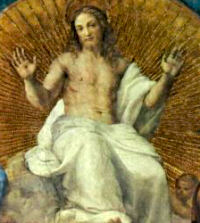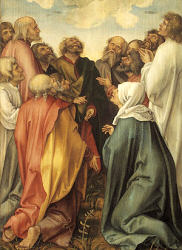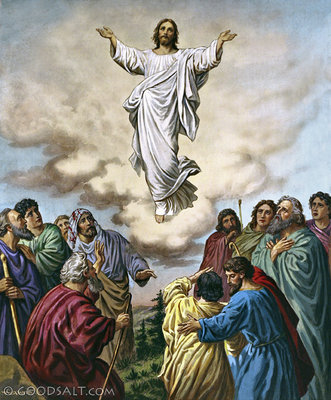Collect: Gladden us with holy joys, almighty God, and make us rejoice with devout thanksgiving, for the Ascension of Christ your Son is our exaltation, and, where the Head has gone before in glory, the Body is called to follow in hope. Through our Lord Jesus Christ, your Son, who lives and reigns with you in the unity of the Holy Spirit, one God, for ever and ever.
Graciously hear our supplications, O Lord, so that we, who believe that the Savior of the human race is with you in your glory, may experience, as he promised, until the end of the world, his abiding presence among us. Who lives and reigns with you in the unity of the Holy Spirit, one God, for ever and ever.
o Apple Fritters
o Apple Ring Fritters
o Beignets
o Beignets de Pommes
o Dolmas
o Stuffed Pigeons
o Ascension Day, the Final Message from Jesus
o Ascension Liturgy and Customs
o Ascension Thursday Activities
o Ascension Thursday Picnic and Traditions
o Family and Friends of Jesus Scrapbook Album
o Teaching the Ascension
o Easter Season II Table Blessing 1
o Book of Blessings: Blessing Before and After Meals: Easter Season (2nd Plan)
o Ascension and Pentecost Prayer Suggestions
o Prayer Cards for Easter Grace at Meals
o Novena to the Holy Spirit
o Book of Blessings: Blessing Before and After Meals: Easter (1st Plan)
o Novena to the Holy Spirit (2)
o Novena for the Ascension
o Glory of the Trinity in Christ's Ascension | Pope John Paul II
o The Ascension Invites Us to a Profound Communion with Jesus | Pope Benedict XVI
· Easter: June 1st
· Solemnity of the Ascension or the Seventh Sunday of Easter
Old Calendar: Sunday within the Octave of Ascension ; Other Titles: Ascension Thursday
At the end of His earthly life Jesus ascends triumphantly into heaven. The Church acclaims Him in His holy humanity, invited to sit on the Father's right hand and to share His glory. But Christ's Ascension is the pledge of our own. Filled with an immense hope, the Church looks up towards her leader, who precedes her into the heavenly home and takes her with Him in His own person: "for the Son of God, after incorporating in Himself those whom the devil's jealousy had banished from the earthly paradise, ascends again to His Father and takes them with Him" (St. Leo).
The ecclesiastical provinces of Boston, Hartford, New York, Newark, Philadelphia, and the State of Nebraska have retained the celebration of the Ascension of the Lord on the proper Thursday, while all other provinces have transferred this solemnity to today, the Seventh Sunday of Easter.
The memorial of St. Justin, martyr, is superseded by the Sunday liturgy.
We continue the Novena to the Holy Spirit.
Click here for commentary on the readings in the Extraordinary Form of the Roman Rite.
The Ascension
The death of a member of his family or of a loved friend, must be the saddest event imaginable in the life of an atheist. He is one who really is convinced that there is no God, no future life and therefore that the relative or friend is to turn into dust in the grave, never to be met with again. The thought that every day that passes is bringing him too nearer to that same sad fate, death, which will be the end of all his ambitions, all his enjoyments, the end of everything he thought he was or had, must be something hard to live with.
Thank God, we have the good fortune to know, and reason and faith convince us of this truth, that death is not the end of man. It is rather the real beginning. Today's feast—the Ascension of our Lord in his human nature—to his Father's and our Father's home, is the confirmation and the guarantee of this doctrine of our faith. We shall all rise from the grave with new, glorified bodies and ascend to heaven, as Christ did. There we'll begin our true life of eternal happiness.
While it is true that even for good Christians the death of a beloved one is a cause of sorrow and tears, this is natural as we still are of the earth earthly. Yet the certitude that our beloved one has gone to his true life and will be there to meet us when our turn comes, is always at the back of our minds to console and comfort us. What all human beings want is to live on forever with our dear ones. Death breaks that continuity but only for a little while. That break is necessary for the new life to begin.
It is only in heaven that this natural desire of an unending life with all those we love can be realized and death on earth is the door to that eternal life.
Look up to heaven today. See Christ ascending to his Father and our Father. Say : Thank you, God, for creating me, and for giving me, through the Incarnation of your beloved Son, the possibility and the assurance that if I do my part here, when death comes it will not be an enemy but a friend, to speed me on my way to the true, supernatural life which you have, in your love, planned and prepared for me.
It was written, and foretold, that Christ should suffer and so enter into his glory. The servant is not above the Master. I too must suffer. I too must accept the hardships and the trials of this life, if I want, and I do, to enter into the life of glory. Christ, who was sinless, suffered hardship and pain. I have earned many, if not all of my hardships, by my own sins. I should be glad of the opportunity to make some atonement for my past offenses, by willingly accepting the crosses he sends me. These crosses are signs of God's interest in my true welfare. Through him he is giving me a chance to prepare myself for the day of reckoning, for the moment of my death which will decide my eternal future. For every prayer I say for success in life, I should say three for a successful death, a death free from sin and at peace with God.
Excepted from The Sunday Readings, Fr. Kevin O'Sullivan, O.F.M.
Things to Do:
- We continue the novena to the Holy Spirit which is said between the feast of the Ascension and Pentecost Sunday.










